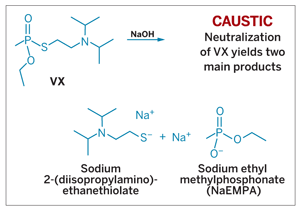Advertisement
Grab your lab coat. Let's get started
Welcome!
Welcome!
Create an account below to get 6 C&EN articles per month, receive newsletters and more - all free.
It seems this is your first time logging in online. Please enter the following information to continue.
As an ACS member you automatically get access to this site. All we need is few more details to create your reading experience.
Not you? Sign in with a different account.
Not you? Sign in with a different account.
ERROR 1
ERROR 1
ERROR 2
ERROR 2
ERROR 2
ERROR 2
ERROR 2
Password and Confirm password must match.
If you have an ACS member number, please enter it here so we can link this account to your membership. (optional)
ERROR 2
ACS values your privacy. By submitting your information, you are gaining access to C&EN and subscribing to our weekly newsletter. We use the information you provide to make your reading experience better, and we will never sell your data to third party members.
Environment
Texas Firm Will Treat Neutralized Nerve Agent
Environmental groups plan to sue to halt Army shipment of caustic waste through eight states
by Lois R. Ember
April 10, 2007
C&EN has learned that the Army awarded a $49 million contract to Veolia Environmental Services of Port Arthur, Texas, on April 9 to incinerate the caustic wastewater from the neutralization of VX nerve agent at the Army's Newport, Ind., facility. The Chemical Weapons Working Group (CWWG), a watchdog group, and several environmental groups intend to sue the Army and Veolia to halt the trucking of the wastewater, called hydrolysate, from Indiana to Texas.

According to Army Chemical Materials Agency spokesman Gregory Mahall, who confirmed the award, the hydrolysate will be trucked through eight states: Indiana, Illinois, Missouri, Arkansas, Tennessee, Mississippi, Louisiana, and Texas. Perhaps as early as April 15, convoys of two to six trucks could begin transporting the hydrolysate.
Veolia already has a permit to incinerate the wastewater, which contains less than 20 ppb of VX. It consists primarily of sodium 2-(diisopropylamino)ethanethiolate, also called thiolamine, and sodium ethylmethylphosphonate, or NaEMPA.
As part of the U.S.'s obligation under the Chemical Weapons Convention, the Army has to date neutralized nearly 50% of the 1,269 tons of VX stored at Newport. The sodium hydroxide/water neutralization process has produced nearly 720,000 gal of hydrolysate that the Army is storing in some 200 containers on-site, says Newport's spokeswoman Terry Arthur.
The Army had originally planned to build a secondary treatment facility on-site to render the hydrolysate safe for disposal. It scrapped that plan after the 2001 terror attacks, contending that it would be faster and less costly to treat the hydrolysate at an off-site commercial waste treatment facility. In December 2002, the Army awarded a contract to Perma-Fix in Dayton, Ohio. But political and community pressure forced Perma-Fix to withdraw from the contract in October 2003.
Two months later, the Army asked DuPont's Secure Environmental Treatment facility in Deepwater, N.J., to consider treating the wastewater. The plan was for DuPont to discharge the product of secondary treatment into the Delaware River. DuPont never signed a contract, and again, political and community pressure forced the company to bow out of the plan on Jan. 5.
Under the treaty, the U.S. receives no credit for destroying the Newport VX nerve agent until the hydrolysate undergoes secondary treatment. The U.S. has an obligation to destroy 45% of its total chemical stockpile of about 30,000 tons by Dec. 31. The Army would like to get credit for destroying at least a portion of the VX stored at the Newport arsenal and has turned to Veolia to do so.
A source associated with the destruction program who asks not to be named tells C&EN that he expects the Army will be sued. "The Army is not going to be able to ship all of the stored hydrolysate to Texas before a lawsuit or injunction stops the transport," he says.
Indeed, CWWG Executive Director Craig E. Williams says his group and several environmental organizations plan "to notify the Army and Veolia of their intent to sue." The groups will file their lawsuit in the U.S. District Court for the District of Columbia citing "the Army's inadequate environmental (NEPA) review process." The lawsuit will also contain an injunctive motion to halt the shipments, Williams says.
According to the unnamed source, "This is the Army's last chance." If the Army is unable to ship the hydrolysate to Veolia, "it will have to design, build, permit, test, and operate an on-site secondary treatment facility." He points out that there are no funds in the Army's so-called chem-demil budget for fiscal 2008 or in the out-years to build such a facility. Failure to ship to Veolia "could extend by three to five years the destruction of VX nerve agent at Newport," he says.





Join the conversation
Contact the reporter
Submit a Letter to the Editor for publication
Engage with us on Twitter